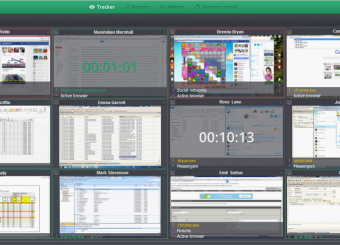In this article, you’ll learn more about top strengths and weaknesses managers have in common and find out how to make leadership more efficient.
Effective management plays a big part in maximizing business performance of any organization. Therefore, it is important for managers to be aware of both strong and limiting points of their abilities. To be a truly great manager, it is important to have a broad set of skills ranging from planning and delegation to communication and motivation.
The ability to evaluate both leadership strengths and weaknesses within a management framework is vital for both organizational and personal growth and improvement.
In today’s article we will list the most common leadership strengths and management weaknesses in today’s organizations and provide tips regarding how managers can maximize their strengths and manage their weaknesses (especially with the help of our Kickidler software).
Top 10 Strengths of a Manager
Once you as a manager understand your strengths and focus on honing them, you can be a more self-aware leader, using your particular set of leadership skills to perform at a high level. Leading with your great qualities is what shows your value to the company. As a manager you should know more about the strengths and weaknesses of employees and learn more about how to maximize team performance.
Strengths you might recognize and take advantage of include:
-
Responsibility
It is essential for managers to have the ability to oversee each individual’s job in the business’s progress. It implies that managers take responsibility for their actions and the actions of their employees. Decent managers search for ways to enable their workers and assist them with fostering their abilities while also helping them become more independent.
-
Leadership (& Being a Role Model)
Leadership is about more than simply giving orders or “handling” a group of people. The capacity of a good manager and leader reflects their ability to motivate, inspire, and influence people around them. They promote diversity and inclusion in the workplace. What’s more, a reputable leader is an excellent role model. Their actions speak louder than words, and they understand the significance of supporting specialists on their teams
-
Reliability
It’s quite literally in managers’ job descriptions to ensure their teams complete assignments and meet deadlines. After all, companies offer management jobs to people who can be trusted to get a job done with little instruction or oversight, which means managers are proven to have a hard-working attitude and dependability that has assisted them with procuring their job title.
-
Motivation
Effective managers inspire their teams to be their best. They’re enthusiastic and passionate about the business, their jobs and company values. Managers come up with innovative ideas that excite their teams, and they give their employees support and encouragement that they may need.
-
Technical Skills (& Industry Knowledge)
Qualified managers have advanced technical abilities and extensive industry information. They know when to offer support and assist the team with tracking down the best solutions. Skilled managers are in touch with their workers and are adept at moderating unnecessary difficulties, including technology-related ones.
-
Fair Treatment (& Teamwork)
Good managers know how to treat and assess their workers fairly and don’t succumb to favoritism. Even more, having a leadership role, managers need to work well with their employees and other managers alike. Such collaboration with their teams when making decisions, solving problems and coming up with new ideas leads to more positive and productive teams.
-
Delegation (& Empowerment)
Knowing how and when to delegate can assist managers in focusing on fundamental tasks while letting other members of the team grow and develop as specialists. When managers delegate tasks appropriately, they distribute the workload evenly, allowing employees to focus on their areas of expertise. It’s also vital to give credit where credit is due. Additionally, delegation helps empower employees and develop their skills and confidence. When team members take on new challenges and responsibilities, they acquire a broader skillset, leading to personal and professional growth. Employees feel trusted when managers delegate tasks, fostering a sense of ownership and commitment to their work.
-
Problem-Solving (&Decision-Making)
Good managers are able to find innovative solutions to workplace issues by examining situations and identify the best methods for resolving them. It permits them to develop new ideas and approaches to conventional problems as well as assists them with building a cohesive team. Effective managers also possess strong decision-making skills, which come in handy when navigating complex situations. They can analyze information, weigh all the pros and cons objectively, and make well-informed timely decisions. Even more, effective decision-making promotes growth and innovation within the organization. Managers who make strategic decisions based on a thorough assessment of available data create an environment that fosters new ideas, drives innovation, and propels the organization forward.
-
Organization (& Planning)
Well-versed managers know every detail of a certain project or process. They know how to keep their teams coordinated to meet deadlines and expectations so that no critical data or components of a task are overlooked. In terms of planning, managers need to know how to set objectives and determine an appropriate course of action for achieving those objectives. Therefore, they need to possess the strength of environmental scanning, competitors analyzing and forecasting conditions to develop adequate business strategies.
-
Optimism
Great managers maintain a positive outlook about the performance of both their team and the company as a whole. Optimism has the power to motivate employees and elevate their performance. It also fosters a shared vision of success. A good manager realizes that they need to lead by example and infuse the workplace environment with idealism and positive energy.
Top 10 Weaknesses of a Manager
It would be futile to argue that any manager – no matter how efficient they are – still has areas of improvement that they can focus on in order to enhance both their performance and the morale of their team as a whole.
The following are management flaws that you could try to strengthen:
Poor communication skills can cause various cases of misunderstanding, lead to missed deadlines, and overall result in workplace conflicts and toxic work environment. A poorly communicated message can have a detrimental impact on employee morale. Frustration and dissatisfaction may arise when employees are left in the dark or receive mixed messages. The lack of clarity in expectations and goals leads to confusion and reduces overall productivity and collaboration. So in essence, it’s crucial for managers to actively work on improving their communication skills and ensure that the flow of information is transparent.
-
Poor Communication
Managers require strong communication skills in order to do their job successfully. A manager who cannot articulate directives when it comes to decomposing projects, solving client issues, or resolving interpersonal employee disputes will have difficulty carrying out the goals of their position.
-
Low EQ
A manager who lacks emotional intelligence (EQ) isn’t able to understand the emotions of their employees and can be insensitive or unaware of their feelings. Managers need to work on adopting an attitude that demonstrates understanding, empathy, and sensitivity. What’s more, effective leaders are skilled at managing their emotions and those of others, paying attention to feedback from team members so that they can acknowledge and correct any mistakes or misunderstandings.
-
Poor Decision-Making
Ineffective decision-making is a weakness that can hinder progress and innovation within an organization. Managers who lack the ability to analyze complex situations may be unable to make well-informed decisions, which in turn can result in wasted resources or missed opportunities. What’s more, making hasty (or biased) decisions without considering all relevant factors may lead to adverse outcomes.
Effective managers acknowledge the importance of gathering and evaluating data objectively, seeking multiple perspectives, and carefully weighing the potential consequences before making a decision.
-
Lack of Confidence
Managers who are insecure (or even introverted) might not inspire confidence and trust when leading meetings or making decisions. It’s pretty much impossible to gain a team’s trust and respect without self-confidence. Therefore, managers need to believe in themselves and demonstrate confidence, reliability and commitment in their actions.
-
Poor Time Management
A manager who doesn’t use their own time well will experience issues handling the time of others when it comes to assigning tasks and monitoring their execution. Indications of poor time management include regular interruption of ongoing work processes, missed deadlines, last-minute rushes on projects, and overall work routine tardiness.
-
Unwillingness to Change
There are examples when managers tend to resist change because they’re comfortable with the way they’ve been doing things throughout their career. After all, the methods they’ve chosen to stick to have gotten them up the ladder, and they might not want to risk trying new things.
However, in order to be an effective manager, you need to be willing to adapt and change as the times, the industry, and the company itself change. It’s wise to be open to new ideas and strategies so that your team growth and unleashes its full potential.
-
Poor Team-Building
It’s the nature of the job for managers to facilitate a culture of cooperation, embrace teamwork and elevate the efforts of each individual. A decent manager leads from the standpoint of incorporation, welcomes all business ideas, and shares credit where credit is due. A good manager also encourages each member of their team to embrace leadership roles and self-monitoring instead of constantly trying to micromanage them.
-
Micromanagement (& Lack of Delegation)
Micromanagement and the inability to delegate tasks in a sensible way are weaknesses that hinder employee growth, collaboration, and overall productivity. When managers resort to micromanagement, they stifle individual autonomy, creating a climate of dependency and diminished motivation.
In contrast, effective managers recognize the strengths and abilities of each of their team members and delegate tasks accordingly. This approach promotes employee development and encourages teamwork, enabling companies to tap into the diverse skills of their workforce.
-
Prejudice (& Bias)
A manager with assumptions about individuals or processes will weaken the internal company structure. Managers must be socially sensitive and treat all direct reports with deference. Some managers may unintentionally show favoritism for their strongest employees, and such bias can lower the morale of the rest of their team. Everyone deserves to be treated equally so that you can build a team that is strong, productive, and motivated.
-
No Vision
When a manager doesn’t have a clear vision for their team in terms of where they’re heading, it can hinder their overall productivity. Therefore, it’s important for managers to foster a vision statement that guides their objectives, which can be incredibly helpful with keeping the team working towards the same objectives and business goals.
How to Ensure Efficient Leadership with Kickidler?
Now that you’ve gained well-rounded understanding of the most common strengths and weaknesses of management, the question arises, “How do I become more effective in my role as a manager?”
This is where our tool comes into play. Kickidler project management tool can provide you with assistance necessary to achieve success.
Here are a few of the software’s useful features when it comes to honing your manager strengths and working on your personal weaknesses:
-
Real-time monitoring provides you with visual examples of actual employee performance, offering context in case of disputes and helping to identify potentially inefficient processes.
It also has the potential to improve your problem-solving and decision-making skills, enabling you to make fair and unbiased decisions as a manager based solely on the quality of employee performance.
-
Various notifications and reminders help optimize workflow, reduce the amount of time you unnecessarily spend on handling each violation manually and increase employee motivation with no forced interruptions into employees’ routines.
This aids in empowering employees to be more autonomous and helps with improving teamwork as a whole.
-
Robust time tracking functionality automates and optimizes the very process of time tracking in your team, thus helping you to boost productivity and efficiency without the efforts of direct supervision.
It helps to reduce micromanagement within the team, improve time management of both you as a leader and the members of your team, and make workflow more transparent for all parties involved.
-
Diverse reporting options in terms of worktime and productivity help optimize work operations and increase business efficiency.
Powerful analytics of the software provide you with the most precise data regarding the involvement of all the team members in the internal work processes of the company. They help take appropriate managerial steps to increase the overall performance.
- Kickidler Project Tracking suite can help you with:
- Organizing and prioritizing work among your employees
- Tracking progress and receiving status updates
- Fostering collaboration and healthy communication within the team
In Lieu of a Conclusion
Effective management practices entail a range of manager strengths that shape the dynamics within a company. By harnessing their key strengths, managers can create a positive work culture and drive productivity and innovation across their team.
However, it is also important to acknowledge and address the weaknesses that can hinder the success of the business. By focusing on improving such skills as communication, decision-making, and delegation, to name a few, managers can foster a supporting, empowering environment that maximizes the potential of each employee to the fullest and drives the organization towards achieving its goals.
Continuous evaluation and improvement of one’s management skills are crucial for success in an ever-changing business landscape. By actively enhancing their strengths and working on improving their weaknesses, managers can contribute to the growth and development of their teams and the overall success of the company.
Streamline the way you interact with your employees. An automated monitoring tool like Kickidler can give you a real-time overview of the state of affairs in your team and provide you with a clear status of all the projects and tasks, keeping you and every member of your team on track.
Give Kickidler a try today and let it help you uncover your true power as a manager!
Kickidler Employee Monitoring Software
Share this post


 ENG
ENG 














